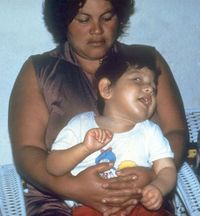Hesperian Health Guides
Chapter 33: The Child with Several Severe Disabilities
 |
| A child with multiple disabilities, including severe cerebral palsy, vision loss, seizures and cognitive delay. |
Some children have a combination of severe disabilities. For example, a child may have severe cognitive delay and have little or no physical control of his body. He may also have vision or hearing loss, have seizures, or have difficulty swallowing. Or he may have any combination of these disabilities— and perhaps develop severe behavior problems.
Caring for children with multiple and severe disabilities is never easy; they need an enormous amount of time, patience, and love. In most communities, parents and close family members will be the main care providers. But parents will need a lot of support from the community in order to care adequately for the child. Unless parents have help, they are likely to find that the continual demands of caring for their child are too much. Even the most loving parents, after months and years of continuously caring for a child with severe disabilities, can easily become frustrated and angry. This is especially true when the child shows little progress or response, and grows up to be a physical adult with the needs of a young child. It is not uncommon for a parent who for years has poured love and attention into a child with severe disabilities, to suddenly hit the child or in other ways begin to neglect or mistreat him.
Before we blame the parent for this, we should try to put ourselves in her position. She has given the child her total love and attention for years. She has waited for a change, for a smile, for some return of warmth and love. But the child remains like a newborn baby, becoming stiffer, more fussy, and more difficult to lift and care for as he grows. Any human being can only give so much without receiving something in return, some sign of recognition or appreciation. In time, the parent is overcome by the unfairness of the situation: the lack of appreciation, the constant demands, the lack of help, the hurt. She reaches her limit and hurts the child in return. Rather than blame her, we should try to understand her. Above all, we should look for ways to help both the family and child—if possible, long before the mother or other family members reach their limit.


